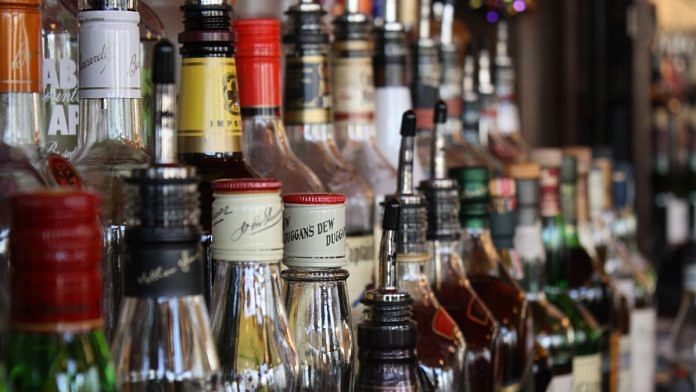Gujarat has had a prohibition law since its formulation in 1960, but that hasn’t stopped residents from consuming alcohol. In fact, the high level of consumption is perhaps the state’s worst-kept secret. Bootleggers cover every locality, operating through WhatsApp messages or phone calls. Like food delivery networks, they deliver the alcohol of your choice to your doorstep in a quick time, and payment is made in cash or digitally.
During the state assembly’s budget session last year, it was revealed that liquor worth more than Rs 300 crore had been seized over the past two years in Gujarat. This is the proverbial drop in the ocean – the state is anything but dry. According to the data figures collected during the National Drug Use Survey in 2019 by AIIMS, 4.3 per cent of people had alcohol dependence. However, these are just the official figures and this statistic can be safely dismissed.
It’s a well-oiled network – the spirits are smuggled in from adjoining states and the process is lubricated with bribes to police and other officials. No wonder the punitive system doesn’t work – every year, thousands of prohibition violation cases are registered but conviction rates are low, which indicates a lack of motivation to enforce the law. Between 1999 and 2009, the conviction rate was a mere 9 per cent.
Prohibition also means a loss of tax revenue, which many estimates put at well over $2 billion, or Rs 16,000 crore.
Also read: Bihar continuing with liquor ban is an exercise in madness with no method
Widened black markets and hooch tragedies
The fact is that bans don’t curb demand; they only make the product hard to get. Bootleggers and corrupt officials step into this gap. A World Health Organization report said that 50 per cent of the alcohol consumed in India is unrecorded and is part of non-tax, counterfeit activity. It argued that prohibition creates restrictions that, in fact, raise the risks to consumers and widen the black market.
The latest evidence of this came from Bihar. More than 70 people died in December 2022 after drinking illicitly brewed country liquor. Hundreds were hospitalised. The epicenter was Chapra in the Saran district, but deaths were also reported from neighbouring cities, Siwan and Begusarai.
Gujarat itself has seen several such tragedies.Last July, illicit liquor killed 125 people in Baroda, 150 in Ahmedabad, and 42 in Botad.
Misguided justification for prohibition
The most common justification for alcohol bans is rooted in a misguided attempt to curb the social evil of domestic abuse. This is an oversimplification of the problem and not borne out of research. The National Family Health Survey conducted across India in 2005-2006 reported that 51 per cent of the men in Bihar justified beating their wives. This was when Bihar did not have alcohol ban. In Gujarat, where prohibition was in force, the share of such men was at 74 per cent. It surpassed Bihar and showed that domestic abuse by men, who squander their money on alcohol and then come home to assault their wives, needs more research.
We have evidence of prohibition’s shortcomings in other countries too. The infamous Italian mafia in Chicago and New York made a killing during the US’ prohibition era of the 1920s. The money it made funded its evolution into a hydra-headed monster that diversified into a range of illegal trades, from arms to cocaine.
When prohibition was in force in Mumbai in the 1960s, locally brewed liquor was served to tipplers in homes that came to be known as ‘Aunty bars’.
Moral of the story: those who wish to drink, will always find a way.
Also read: ‘Where’s the ban? Men still get liquor illegally and die.’ Anger over Bihar hooch tragedy
Tax benefit of alcohol
Gujarat has always had a laser-like focus on its economy, so it’s worth examining alcohol ban from the economic perspective. It indirectly affects foreign investment too. Prohibition is a huge cultural shift for foreign investors and, without it, Gujarat would attract even more of them. Gujarat too can become a global business hub like Mumbai.
The sensible thing would be to instead regulate alcohol sales and tax the industry. Taxes on alcohol are high across the country, so the price points would organically reduce consumption and result in great revenue for the government. This money can be utilised for developmental purposes such as schools and hospitals, and even be invested in enforcement to curb illegal brewing of hooch. This money would also prove valuable to open alcohol and substance de-addiction centres, and sensitising the community about the effects of alcohol addiction.
Laws are most effective when they are reformative instead of retributive. After all, it’s tough to change mindsets overnight and prohibition smacks too much of a curb on individual freedom. Gujarat is Prime Minister Narendra Modi’s state and he would do well to understand the benefits of decriminalising alcohol. It would be a step towards progressiveness.
Thought through logically, there is no real argument for prohibition to continue other than it seems to have some political benefit. It’s an archaic idea and it doesn’t work. Gujarat should lead the way by throwing out a law that has no place in the 21st century.
Asha Jadeja is a Silicon Valley-based entrepreneur, venture capitalist, philanthropist and a ‘change agent’. She tweets @ashajadeja325. Views are personal.
(Edited by Ratan Priya)



